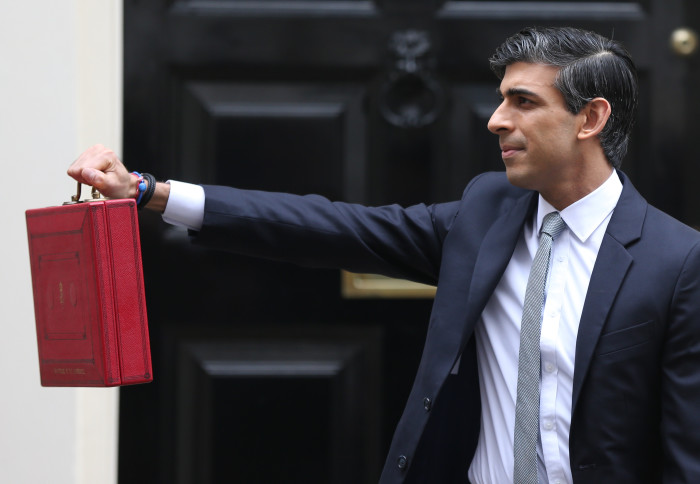UK Autumn Budget 2021: Imperial experts respond

Chancellor of the Exchequer Rishi Sunak outside 11 Downing Street before delivering the Spring budget in March 2021
Academics and researchers from across Imperial College London have provided analysis of the 2021 Autumn budget.
Academics from across Imperial College London have offered reactions and expert comment to the 2021 Autumn budget, announced on Wednesday 27 October by Rishi Sunak, Chancellor of the Exchequer.
Among the announcements were lower rates of Air Passenger Duty for domestic flights, cuts to duty of draught beer and sparkling wine, funding for schools and cancelling the planned rise in fuel duty.
Reducing inequalities
Professor Sonia Saxena, Professor of Primary Care, School of Public Health: “Health, social, and economic environments are intertwined from birth. If we want to prevent disadvantaged children reaching adolescence and adulthood in worse health than their peers, we need to improve conditions during pregnancy and childhood. Doing so will support the healthy development of children and reduce inequalities across their entire lifespan.
"Funding for practical measures to increase some support for parents is welcome, but there is a real need to help families out of poverty. This means fundamental changes to housing, education and social care funding to support parents with living costs, affordable childcare and training and job opportunities. If these factors are not also addressed, it is hard to see how these new proposals will help.”

Clearing the backlog
Professor Dame Carol Propper, Professor of Economics at Imperial College Business School said: “The extra monies announced for the NHS to clear diagnostic waiting lists will go some way to clearing the huge backlog that has built up during COVID, but it will not address the staffing crisis that the NHS is experiencing as extra machines need staff to operate them. In addition, a much more root and branch investment in IT is needed to enable the NHS to benefit from the kind of efficiency savings that better, and more joined up, IT systems would give them.”
Managing mental health
Professor Sankalp Chaturvedi, Professor of Organisation Behaviour and Leadership said: "While investment in the NHS is always welcome, the Budget continuously undermines the need for specific measures to manage mental health at work and home for the new age. The Budget announcement doesn’t seem to be ready for the future.”
Curative, not preventive approach
Dr Elisa Pineda from Imperial College Business School's Centre for Health Economics & Policy Innovation and the School of Public Health added: "Increases to health research funding are a positive step forward. However, the budget presents contradictions as funding will be mostly focused on a curative approach rather than a preventive approach, which would prevent obesity and non-communicable diseases from happening in the first place.
"With average inflation forecast at 4%, the proposed changes such as to the Universal Credit taper and the National Living Wage are unlikely to be enough to fully compensate for the increase in living costs. These increases could particularly affect healthy food affordability, especially for lower-income households and vulnerable populations. No measures to directly address this were announced.

"In addition, while the proposed simplification of alcohol taxation increases the tax rate on stronger drinks, the tax will decrease for selected beverages. While these drinks may have a lower alcohol content, their sugar content is frequently higher and increased consumption of alcoholic drinks of any strength comes with risks. The proposed changes may promote a higher alcohol intake, which has been linked to cancer, and encourage an unhealthy and obesogenic retail offer.
"Overall, the budget concentrates on a growing economy but forgets to ensure that the population, particularly low-income households, are supported to have healthy diets and lifestyles."
Leading the UK in the wrong direction
Dr Drew Pearce, Research Associate in the Department of Physics at Imperial College London, said: "At a basic level an environmentally compliant budget needs to do two things: firstly it needs to make sustainable activities cheaper, and secondly it needs to make unsustainable activities less cheap.
"If we are to meet the terms of the Paris Agreement, this 2021 budget is leading the UK in the wrong direction: it commits to continued real terms cuts to the cost of driving and adds tax cuts to domestic aviation at a time when we know we need to transition to greener modes in order to reverse damaging growth trends in both these forms of transport."
Sending the wrong message
Professor Martin Siegert, Co-Director, Grantham Institute - Climate Change and the Environment said: "I struggle to see how the government's position on air travel is consistent with their commitment to reach net zero. We should not be cutting air passenger duty on domestic flights given that passengers do not pay VAT on tickets and it sends the wrong message just days before we host COP26.
"The Chancellor should be doing more to encourage train journeys to better connect the UK. It would also make more sense to increase air passenger duty on long haul flights, as they are responsible for a surprisingly high share of emissions."

Dr Mirabelle Muûls from the Business School added: "With COP26 starting in a few days the budget was the opportunity to signal a clear and immediate commitment of the country to a Carbon net-zero economy. The domestic flights tax rebate is just one example of the missing presence of action on climate change in the Budget."
Dr Ajay Gambhir from the Grantham Institute added: "The Government had a well-received Net Zero Strategy from last week, including significant policy and investment commitments, to build on in this Budget. But it rather shot itself in the foot with its cut on domestic air passenger duty. This provides poor optics in the run-up to COP26."
Levy on tobacco industry profits needed
Professor Nick Hopkinson, Professor of Respiratory Medicine said: "Smoking causes a huge burden of premature death and ill health, so action to reduce the affordability of smoking through the budget is welcome. But the tobacco industry remains hugely profitable - what is urgently needed is a polluter-pays levy on tobacco industry profits, which can be used to fund tobacco control measures and help the government to deliver on its Smokefree 2030 pledge."
Simplifying a complex area of taxation
Professor Franco Sassi, Professor of International Health Policy and Economics at Imperial College Business School: "The alcohol tax reform is innovative in its intent to simplify a complex area of taxation and also for being explicitly designed as a policy to address the detrimental social and health consequences of alcohol use. The principle that higher alcohol strength beverages should be taxed more than lower alcohol strength ones may seem obvious, but in fact very few countries tax alcohol in this way, and the Government's attempt to do this is welcome.
"However, the new system does not address the issue that alcohol from high-strength beverages may remain cheaper in many cases, because the price per unit of alcohol is lower in many high-strength beverages. The tax cut for draught beer and cider, the tax break for the hospitality industry, and the freeze on all alcohol duties for yet another year will offset any public health benefits of the proposed reform for a long time. The reform tries to address too many policy goals and as a result it may achieve none."
Prevention is paramount
Dr Marisa Miraldo, Associate Professor in Health Economics at Imperial College Business School, said: "While the increased funding is welcome and needed, whether it will be channelled to the many areas of need still remains to be seen. The announcement emphasised diagnostics and IT, with no clarity on how funding will be channelled to reward existing staff and address frontline staff shortages that will impact the extent to which the waiting list backlog can be addressed in a timely and safe manner.
"The announcement has also been unclear on whether part of the increased funding will be channelled to other areas that are essential for the NHS. Addressing the patient backlog requires better planning tools; lives could have been saved if during the pandemic there had been stronger leadership in defining optimal prioritisation of patients to care, stronger disease management and better prevention. The pandemic taught us that prevention is paramount and essential even beyond preventing COVID.
"The waiting list backlogs will also impact the cost of care, putting hospitals at risk of financial losses, these will not be solved with diagnostics and IT investment."
"You cannot build back better without building back greener"
Professor Richard Templer, Director of Innovation at the Grantham Institute and Director of Development for at the Department of Chemistry said: “There are strong statements with regard to some of the infrastructure projects but nothing about the budget for new affordable housing being contingent on meeting energy efficiency criteria. We need to see more consistency with regard to achieving our net zero targets.
"You cannot build back better without building back greener. Separating these out means it is hard for example to determine whether the budget for new affordable housing is coupled to the budget for warmer, greener buildings.
"There isn’t sufficient evidence of public spending being contingent on delivering on climate targets to demonstrate that we are really getting to grips with how we will drive the creation of the new economy.”
Article text (excluding photos or graphics) © Imperial College London.
Photos and graphics subject to third party copyright used with permission or © Imperial College London.
Reporter
Joanna Wilson
Communications Division